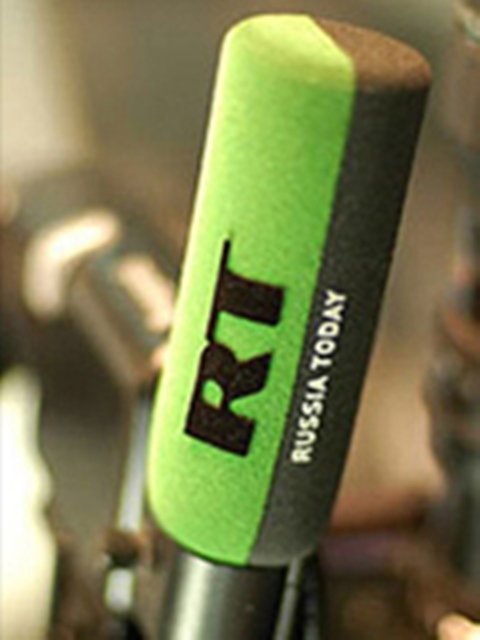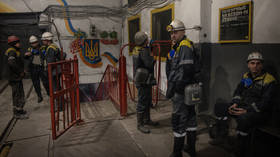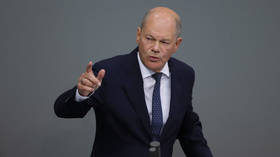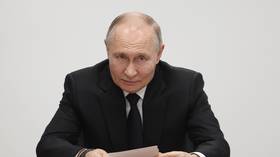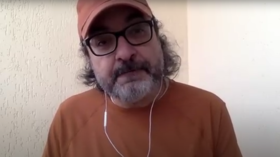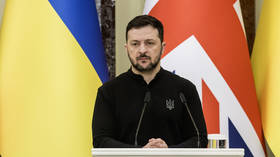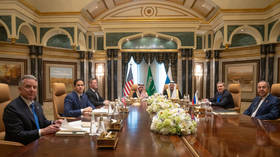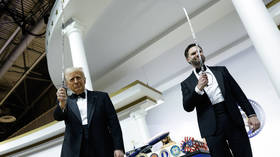Myths, fakes & NATO's easy ride with mainstream media
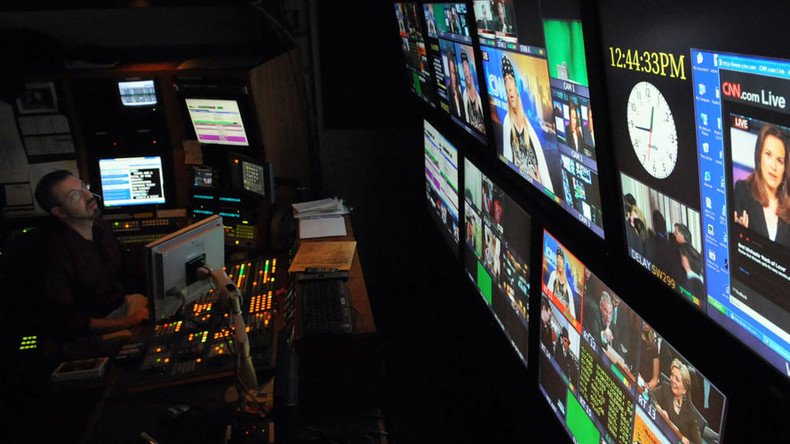
NATO’s latest attack on freedom of thought was unquestioningly embraced by mainstream media – in unwitting service of “fake news.”
During the 2016 US Presidential election, the term “fake news” escaped the media bubble to become the buzzword of the year. Intended as the “proper” media’s expository and damning attack on dodgy sources that attract attention with shocking yet untrue headlines, it quickly morphed into a shorthand for anything and everything that went against the establishment’s narrow range of approved narratives. Clinton – good, Russia – evil, that sort of thing.
Journalistic research done well, @washingtonpost! We're sure error doesn't make your #fakenews report less reliable! https://t.co/CETO5oVPn6pic.twitter.com/syAxLvqAJ6
— RT (@RT_com) 25 ноября 2016 г.
The media that cried “fake news”
Missing the irony entirely, the mainstream press then got terribly aggrieved when the “fake news” label was thrown right back at them by none other than President Trump for that exact same reason.
Who could have ever imagined that when a term built entirely around the concept of empirical, intellectual rigor repeatedly lent itself to a politicized narrative agenda unsupported by facts, it would lose all credibility, and eventually – all meaning?
However, as we know, the establishment takes a while to catch up to the real world. Last weekend, NATO’s old hawks, apparently left unawares that labeling dissent as “disinformation” doesn’t automatically make it so, decided to summarily write off all objections to its policies, actions and talking points with one foolproof refutation: any criticism of NATO is a fake because NATO says it is.
Myth-building alliance
The military club’s latest PR wheeze is a lengthy web page listing what it calls “the facts” of NATO-Russia relations.
In reality, these are NATO’s value-based interpretations of its own agenda – in other words, the alliance’s opinion of itself. But this framework of NATO’s opinion being equated to fact by default delegitimizes any point of view to the contrary, any dissent, disagreement or objection.
The #WashingtonPost teaches us how to make fake news go viral (Op-Ed by Bryan MacDonald) https://t.co/cnIIo8uL9Lpic.twitter.com/fBP52lLkvV
— RT (@RT_com) 1 декабря 2016 г.
In this particular instance, the primary focus of such objectionable objections is Russia. Most of the 32 listed “myths” have something to do with NATO being perceived as a threat (to Russia, but not only) and having committed some kinds of bad acts (many of which had nothing to do with Russia). Russia is, nevertheless, blamed for generating and promoting all of those “myths.”
NATO’s basic counterargument amounts to “Russians are wrong to think and feel how they do.” Or, in more specifically, “Russians are not allowed to think or say NATO is a threat to them despite our military creep eastwards and deployment of soldiers on their borders and missiles in their near abroad.”
The listicle regurgitates other familiar talking points, such as “NATO membership is not imposed on countries. Each sovereign country has the right to choose for itself whether it joins any treaty or alliance” – in the same week that a Gallup poll showed how more people in Ukraine and Moldova regard the group as a threat rather than as protection.
Gallup #Poll: More people in #Ukraine, #Moldova, #Belarus, #Russia, #Armenia, #Kazakhstan & #Serbia view #NATO as threat than as protection pic.twitter.com/58FVMn2b0d
— Ivan Katchanovski (@I_Katchanovski) 12 февраля 2017 г.
These are two countries that NATO has courted for many years. In the Gallup survey, we also see that 64 percent of Serbians believe NATO is a threat and only 6 percent believe it offers protection.
But in its PR push, NATO rejects the notion that its “enlargement in the Balkans is destabilizing” and goes off on a tangent about how “countries in the region have played a significant role in NATO's operations in Afghanistan and Kosovo, providing training to the Afghan forces.”
NATO & friends
Over the past weekend many editors took part in enthusiastically promoting this black vs. white, ‘myth vs. facts’ story put out by NATO. Dozens of journalists took the Organization’s proclamations as inarguable truth largely without caveats, due diligence or any critical analysis
The team at Reuters particularly outdid itself by ramping up the rhetoric with colorful comments from NATO’s spokesperson and de rigueur invocation of RT and Sputnik. It also summarily and failed to provide any balancing perspective, apparently because “The Kremlin, the Russian government, RT, Sputnik, and Life could not immediately be reached for comment.”
Immediately. On 32 “myth charges” at once. On a Saturday night. Oh how much time and scrutiny were afforded for the evaluation of 32 complex geopolitical issues by a news platform of enormous capacity…
Speaking of myths, RT’s Press Office did not receive any queries from Reuters on the matter.
Then again, Reuters doesn’t seem to be generous with the ‘right of reply.’
For when @Reuters & Co print false claims w/o basic fact-check (like site search), don't bother with right of reply https://t.co/iGsQx3UAYt
— RT Press Office (@RT_PressOffice_) 13 февраля 2017 г.
On fire
Reuters’ commitment to the criticism of the Russian media leans heavily on baseless allegations that RT has spread “false stories,” yet the only references are a single example of a report from July 2016 “about a fire raging at a NATO base in Izmir, claiming it was a deliberate sabotage after the failed coup in Turkey.”
But the author fails to mention that (a) there was an evidence of a large-scale fire in the area, with evidence presented not just across social media (with photos and videos) but many news media outlets, including CNN Turk; (b) this was a fast-breaking, developing story and (c) RT immediately included a comment from the NATO spokesperson as soon as it was supplied.
Indeed, the second sentence of the article reads “NATO spokesperson Oana Lungescu has denied the reports of a fire "in or near" territories hosting NATO facilities in Turkey, adding that its HQ "is fully operational,” and prominently displayed a tweet from Lungescu.
This hardly seems like an inspired “fake news”-promoting effort.
Truth in the news
And this brings us back to the whole “fake news” thing. Surely, this zero-sum coverage of NATO’s role in Europe, which ignores or dismisses the worries of millions of the continent's citizens and several governments is worthy of being at the very least examined as misleading?
The same rigorous test should be applied to the mainstream media’s tendency to act as an unquestioning promotional vehicle for US/Alliance’s military interests, accepting NATO statements at face value. Especially when such claims play like an echo of those about "Iraq’s weapons of mass destruction" and "Aleppo's last hospital," which seemed to vanish and reappear practically every week last year.
This is #FakeNews - Aleppo's last functioning hospital was destroyed by Russia no less than 12 times between August and November last year. pic.twitter.com/iMXyzI9UCN
— Deplorable Swede (@LVX156) 8 февраля 2017 г.
With every news cycle, it becomes increasingly evident the mainstream media seems to believe “fake news” is totally terrible, unless it is about Russia when it becomes totally acceptable. And that every claim needs to be rigorously fact-checked unless it is made by the “good guys,” like NATO. And the good guys, in turn, are free to slap a “fake news” label on any actor or argument they don’t like. But really, mostly, Russia.
This is exactly how we have arrived at a point where supposedly respectable outlets have created a world where Vladimir Putin has managed to become the richest man in the world (Washington Post), who controls Donald Trump (Huffington Post) and masterminded his election victory (Vanity Fair) despite battling Aspergers (USA Today), and cancer (The Week), and also traveling through time.
At this rate, if the term “fake news” loses all meaning in the next few months, if not weeks, the mainstream media will have no one but itself to blame.
The statements, views and opinions expressed in this column are solely those of the author and do not necessarily represent those of RT.
